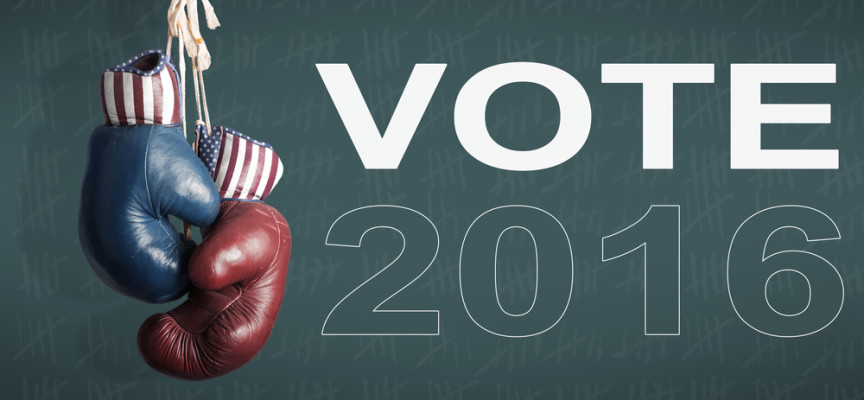On Tuesday, the New York Times published James K. Glassman’s opinion, “Save the Republican Party: Vote for Clinton.” Glassman, a thoughtful and respected Republican who served in the George W. Bush administration, argues that Republicans who are opposed to Mr. Trump should vote for Mrs. Clinton instead of taking the timid and harmful option of sitting out the election or supporting a third-party candidate.
In Glassman’s view Mr. Trump is clearly a worse choice than Mrs. Clinton. He argues that Mr. Trump is temperamentally unfit for the presidency and his policy formulations “mock the principles of liberty and respect for the individual that have been the foundation of the Republican Party since Abraham Lincoln.” If Trump wins, he argues, the GOP will atrophy and die within a few years. Therefore, the matter of how Republicans should cast their votes is a matter of simple math: a vote for Mrs. Clinton helps her win but saves the Republican Party, while an abstention helps Mr. Trump win but destroys the GOP.
In response to Glassman, I argue that Republicans should not vote for Mrs. Clinton. I write as a conservative evangelical Republican who has always voted for the Republican nominee for president, but who thinks we should consider voting third-party or writing in a candidate. The 2016 election is not a matter of simple math and Americans should be more concerned about saving the nation than they are saving the Republican Party.
First, it is not clear which candidate is less bad than the other.
Glassman is wrong to say that Mrs. Clinton is clearly superior. Mrs. Clinton is a bad candidate, and she is bad in predictable ways. She keeps secrets from the American people and her governing ideology and policy stances are averse to a conservative Christian vision of the good life. But Mr. Trump’s badness is less predictable. He’s the highest variable candidate in modern political history. If the pragmatic side of his persona wins the day, and if he allows his advisors to curb the negative inclinations of his temperament, he would be better than Mrs. Clinton. However, if the hard-line nationalist side of his persona wins the day, and if he continues to be volatile, retaliatory, and unwilling to listen to his advisors, he would be worse than Mrs. Clinton.
Second, we have little or nothing to lose by voting for an alternative candidate.
The 2016 election cycle is different from recent elections. The two major-party nominees are equally unacceptable, albeit in their own unique manners. Mr. Trump has run a campaign characterized by ethno-nationalistic aggression, admiration of authoritarians like Vladimir Putin, intimations of coming restrictions on free speech, demeaning and degrading speech toward opponents, an uninformed and potentially dangerous approach to foreign policy, and questionable commitments to the social and economic agenda of the GOP. Mrs. Clinton has repeatedly broken the trust of the American people, used her White House leverage to serve her Foundation’s best interests, and carved out a leftist social and economic agenda that will hurt nobody moreso than the poor and the religious.
In recent election cycles, it would have been unwise for a conservative evangelical Republican to write in a candidate or vote third-party. Doing so en masse could have taken an election’s outcome in a direction they didn’t desire or intend by tipping the vote toward the least desirable candidate. However, I am arguing that the two major nominees are unacceptable in a roughly equal way. The “lesser of two evils” argument doesn’t apply.
Third, we stand to benefit from voting for an alternative candidate.
Not only do we have nothing to lose, but we stand to benefit from voting for an alternative candidate who best embodies our convictions. Some evangelicals will do this because they feel conscience-bound not to vote for the major-party nominees. Other evangelicals will write in a candidate as an act of protest, in the hopes of fostering long-term change. Although we may lose short-term influence by dissociating from a major party, we regain our voice by making a statement about the unacceptability of the major nominees and about our long-term vision for American society.
Unfortunately, the 2016 election cycle has cost Americans our credibility. How do Americans, and especially conservative evangelicals, recover? Not by voting for a candidate we suspect might be less bad than the other, but by voting third-party or writing in a candidate who best embodies our vision for the faithful and wise governance of American society. In so doing, we have the opportunity to regain our voice rather than having it purchased or controlled by the power-brokers of either major political party.
Subscribe
Never miss a post! Have all new posts delivered straight to your inbox.








I’m with you Dr. Ashford – I’m voting as though my vote is meaningless! I’ll probably pull the lever for the Constitution Party, but I know that God is and always be Sovereign !
Steve: yes sir, God is sovereign. He is King over the kings in ways that we cannot see or comprehend. That is our sure hope.
This article is nuts and totally devoid of reality.
Geno, thank you for your unique perspective, which refreshes and challenges us all.
BWAHAHA!!!
As Christians, we have a responsibility to vote. In the 2012 election, 25 million Christians did not vote. Obama only won by 5 million votes. Many who did not vote did so because they could not vote for Romney as he was Mormon. The result was four more years of progressive leadership where Christian values were attacked and our rights diminished.
Trump may be an unknown, but Clinton is a known evil. As such, my vote and my ‘voice’ will be to vote for whomever has a chance of defeating her. In my opinion, casting a vote for a third party or some write in candidate may provide one a clear conscience but in reality does nothing to prevent four more years of progressive leadership and a gridlocked political system.
What good has the ‘Christian voice’ done in preventing transgender rights in public bathrooms or protect small businesses when they do not wish to support homosexual themes? Nothing. We must use the systems and structures that are in place today to reduce evil in our world. That is reality.
Voting for someone who can actually defeat Clinton and the progressive evil she represents is the only true choice this fall. Otherwise, our ‘voice’ is no more than just a resounding gong or a clanging cymbal.
Ernie, hi and thank you. I agree with you that we’d like to put a stop to the progressive agenda. But I disagree with you that Trump is the solution. As I see it, he is a mixture of progressive (on social and moral issues, his lifetime record is progressive, and during this campaign, he’s repeatedly stated that he’s not the “conservative” nominee, but the Republican nominee), nationalist (he wants to change our country’s political debate from being “conservative vs. liberal” to “open country vs. closed country,” and could have run for President under either party’s platform but chose the GOP because it was weakest right now), and self-interested businessman and celebrity. I think is rhetoric is volatile, often demeaning and degrading toward anybody different than him, and pours gasoline on the fire of civil unrest and could draw attacks from foreign actors and terror actors. I hope I’m wrong.
Bruce,
I agree with most of your perspective of who Trump is. Furthermore, we agree completely on who Clinton is. One of these two will be President of the USA. Lets not kid ourselves with other thoughts.
Trump has surrounded himself with men of conservative character: Carson, Gingrich, Giuliani, etc. I will hope and pray that they keep him focused on protecting the religious liberties we all hold dear.
How does your recommendation to vote neither for Trump or Clinton in any way prevents Clinton’s progressive/liberal ideals from being implemented? Let us not extend Obama’s legacy another eight years.
(Bruce – Always good to chat with you. Have a great day!)
Thanks Ernie, same to you!
So…I know a lot of Christian friends voting for Trump because they think he will appoint conservative Supreme Court justices, which they argue will have more impact than the President. Maybe…but I don’t trust him!
Thank you Natasha!
Bruce,
Sorry, I am not with you on this one. I first admit I am a Republican all my voting life. Voting a third party will surely see a Trump defeat but that’s the purpose of voting 3rd party is to satisfy one’s conscience to vote, isn’t it? How is that a better choice than voting for the lesser of two evils? A third party candidate is a waste and does nothing. The most disturbing thing to me should Clinton win is another 50 years of liberal judicial system especially the SCOTUS. If I remember my high school civics class right it is not the larger popular vote that declares a winner but the 50 states’ electoral votes that elects a president. All a candidate needs is 270 or more electoral votes to win. Clinton has over 340 vs Trump’s 200+ at least 60 short. What we are shouting about is just moot.
Thanks for weighing in Don. But to be clear: I am saying that there is not a lesser of two evils.
After reading some of the comments, I’m struck by the apparent, if unaware , lack of faith in some of my brothers and sisters. Do we live by virtue of the Supreme Court or the person who in the White House? Or are we citizens of Heaven? A peculiar people set apart for His Glory? I’ve been voting republican for 40 years and abortion is still rampant, government is still bloated, and taxes have increased. The church in the meantime has become to an extent comfortable, less missional, more complacent. Perhaps Secretary Clinton and Mr. Trump have done believers a greater service than they know, in that we’ve an opportunity to re focus on the things that are of eternal consequence, rather the temporal things including the upcoming election!
Bruce I have thought the same way you do. Figured I would write in my name. If we all could agree on the same person to write in maybe they could win.
I to would have a hard time with Clinton. I feel she should be in prison instead of running for Presdent.
Thank you, Dr. Ashford. What seems to be a common theme among Christians who are Trump apologists is their assumption that the strength and influence of God’s people in America depends on the results of a political election. The NT teaches that the strength of our influence magnifies in proportion to our holiness (Phil. 2:15; 1 Peter 3:15-17). So when Christians who vote for a third party candidate are accused of doing so to “satisfy our consciences” as if this were something naive, I find that disturbing. We cannot pretend that the hagiographies of Trump purported by high-profile evangelical leaders have not seriously damaged our witness. After decades of confronting the very immorality around which Trump has built his empire, we cannot assume that even tacit support of Trump will not further the hemorrhaging. Evangelicals do not live in a bubble; the lost are watching. There is FAR more at stake here than the results of one election.
Bruce,
I agree with your views and reasoning. However I cannot forsee any great impact from our third party vote, as the president in actuality is voted through electoral votes. I personally think to achieve greater democracy where such an impact could occur is through direct vote. As it stands right now, I don’t really see a difference between voting “a lesser evil”, voting a third party/write in candidate/ or not voting at all.
To quote Professor Marc Lamont Hill of Morehouse College:
“We can afford to lose an election, we can’t afford to lose our values.”
As long as we keep thinking within the box of Red vs. Blue, liberal vs. conservative, the two major parties take our votes for granted, no matter who we are.
When offering advice to other Christians about how to vote in the presidential election, I think it would be very helpful to acknowledge the perspective of other Christian leaders like Dr. Wayne Grudem, a widely respected evangelical professor of Christian ethics for 39 years and author of the book entitled Politics According to the Bible. Dr. Grudem recently wrote an article entitled Why Voting for Donald Trump is a Morally Good Choice: http://m.townhall.com/columnists/waynegrudem/2016/07/28/why-voting-for-donald-trump-is-a-morally-good-choice-n2199564?utm_source=thdaily&utm_medium=email&utm_campaign=nl&newsletterad=
In Christ, Jere Royall
Thank you Jere!
Most of the above exchanges, those that advocate 3rd party votes, which is a perfect example of cutting off one’s nose to spite his face, reminds me of a recent tv commercial. I do not even remember the sponsor, but it depicted a field full of men, all bent over with their heads buried in the sand, when suddenly they all emerge, begin to run at break neck speed, then as with those paragons of virtue, Thelma and Louise , proceed to run off a cliff.
Although the actual act of running off the cliff is not shown, the same as present result of voting for either hillary or 3rd party vote, we all surely know the result. It does not take a genius to figure the result of just one more liberal voting member sitting on SCOTUS. Wake up, good people. THAT ONE FACT ALONE SHOULD BE ENOUGH FOR ANY THINKING PERSON TO CAST THEIR VOTE FOR THE ONLY CANDIDATE THAT WILL GIVE US ANY CHANCE.
Lavelle, thank you. Your opinion is valid and I’m glad you expressed it. However, the way you stated your comment seems to imply that all “thinking people” will draw the same conclusion as you and stop trying to be “paragons of virtue” who are running off a cliff to their own death. I don’t agree. I think this particular election cycle is very different from past cycles and that good thinking people will disagree on what to do.